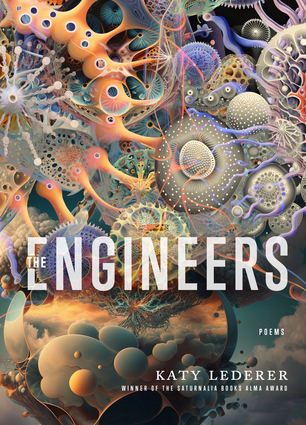Katy Lederer, The Engineers: Poems
MUTATIONS I
We had been organismsmostly, as we slung our legs across the plain.
Observed, we wereobservable. Before we saw, we closed our eyes.
Before we could becomeourselves, we had to name the animals;
successive in ourshortening, unable to extend our lives.
Observed we wereobservable. Before we knocked, we closed our eyes.
Late-acting, deleterious,we saw by death we would be had.
Successful in ourshortening, unable to extend our lives.
Contemplative without ourtails, we knew we’d say what could be said.
Lactating, deleterious,we saw by death we would be had.
What seekingunobtainable, pursuing prey, we closed right in.
Contemplative without ourtales, we knew we’d say what could be said.
What knowing wasunknowable, without our eyes we might have seen.
What seekinginexplicable, pursuing prey, we closed right in.
Before we could controlourselves, we had to name the animals.
What showing wasun-showable, without our eyes we might have seen.
As organisms mostly, we wouldsling our lives across the pain.
 Fora while now I’ve been anticipating New York poet Katy Lederer’s latestcollection,
The Engineers: Poems
(Ardmore PA: Saturnalia Books, 2023), acollection that incorporates several poems from her chapbook
The Children
(above/ground press, 2017). “Sometimes, in the middle / of the night,” opensthe first poem in the collection, “FETUS PAPYRACEUS,” “our children will /insist that we tell them a story. / In the story, after heavy / rhyme andinsistent inculcation / of our customary ways, / our children will look down /at our apparent missing limbs, / which remind them / that they should nottouch, / and, if they do decide to touch, / that absence will feel presence.” Theauthor of a memoir,
Poker Face: A Girlhood Among Gamblers
(Crown, 2003),as well as three prior full-length poetry collections—
Winter Sex
(Verse/Wave Books, 2004),
The Heaven-Sent Leaf
(BOA Editions, 2008) [see my review of such here] and
The bright red horse—and the blue—
(Atelos,2017) [see my review of such here]—the poems of The Engineers: Poemsoffer lyric narratives that wrap and coil around and through rhythm and repetition,offering an examination of the history of the human body, running the gamutfrom the abstract to the deeply and immediately intimate. “We can look into thetissue,” she writes, as part of the poem “INFLAMMATION,” “can examine the finegradient. // We can speak in foreign languages, the language of the internet, /or maybe in the language of cell death. // Have we reached the site of injury?/ We have been injurious. // Have we served well on our jury? / We have juried.We have jured and jured. // We are sad. / Sad as a parent.” Onemight suggest this a book entirely set through and around the body, abook-length suite of poems offering insight and commentary into physicallimitations and requirements. I’m intrigued at how her poems echo, even loopback into each other, playing with repetition and shadow, curling back across acollection of poems interconnected at a rather deep and subtle level. Is therea better word to describe any part of this collection, whether in part orwhole, as sublime?
Fora while now I’ve been anticipating New York poet Katy Lederer’s latestcollection,
The Engineers: Poems
(Ardmore PA: Saturnalia Books, 2023), acollection that incorporates several poems from her chapbook
The Children
(above/ground press, 2017). “Sometimes, in the middle / of the night,” opensthe first poem in the collection, “FETUS PAPYRACEUS,” “our children will /insist that we tell them a story. / In the story, after heavy / rhyme andinsistent inculcation / of our customary ways, / our children will look down /at our apparent missing limbs, / which remind them / that they should nottouch, / and, if they do decide to touch, / that absence will feel presence.” Theauthor of a memoir,
Poker Face: A Girlhood Among Gamblers
(Crown, 2003),as well as three prior full-length poetry collections—
Winter Sex
(Verse/Wave Books, 2004),
The Heaven-Sent Leaf
(BOA Editions, 2008) [see my review of such here] and
The bright red horse—and the blue—
(Atelos,2017) [see my review of such here]—the poems of The Engineers: Poemsoffer lyric narratives that wrap and coil around and through rhythm and repetition,offering an examination of the history of the human body, running the gamutfrom the abstract to the deeply and immediately intimate. “We can look into thetissue,” she writes, as part of the poem “INFLAMMATION,” “can examine the finegradient. // We can speak in foreign languages, the language of the internet, /or maybe in the language of cell death. // Have we reached the site of injury?/ We have been injurious. // Have we served well on our jury? / We have juried.We have jured and jured. // We are sad. / Sad as a parent.” Onemight suggest this a book entirely set through and around the body, abook-length suite of poems offering insight and commentary into physicallimitations and requirements. I’m intrigued at how her poems echo, even loopback into each other, playing with repetition and shadow, curling back across acollection of poems interconnected at a rather deep and subtle level. Is therea better word to describe any part of this collection, whether in part orwhole, as sublime?



